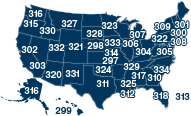Mail Handlers across the country continue to be adversely affected by the Postal Service implementation of wholesale and unwarranted bid reversions, job abolishments, and excessing. Management also has been indiscriminately changing the schedules, start times, and rest days of thousands of duty assignments without regard to how this affects the lives of Mail Handlers and without concern on how these changes affect the service that we provide to the American public.
During ongoing discussions with the NPMHU, postal management argues that these changes are necessary because of the continuing decline in mail volumes, especially in First-Class Mail, and the resulting drop in revenue. Postal management further claims that it must reduce its work hours and transportation costs. USPS Headquarters therefore has directed all Postal Areas to assess their current workforce complements and make the necessary adjustments (cuts) to reflect the decline in mail volume. This decision to implement wholesale schedule changes and potential closings and consolidations is an extremely bad idea.
At the bottom of these planned changes is the Function-1 Scheduler, a management tool that is being used by the Postal Service to “justify,” with charts and graphs and numbers, these unwarranted schedule changes and possible excessing of employees, both within and outside of each installation. NPMHU representatives at the Regional, Local, and Branch levels are meeting with their counterparts from the Postal Service to discuss the impacts at each individual installation. All of the appropriate and necessary grievances are being filed at the Local level to contest the Postal Service’s unwarranted attacks on its own employees.
In November, the National Office filed an Unfair Labor Practice charge with the National Labor Relations Board, trying to compel the Postal Service into disclosing more information about the F-1 Scheduler and its impact on mail handlers and other postal employees. Now, as more information has been obtained, the NPMHU believes that substantial parts of the F-1 Scheduler have been designed and are based on time and work studies that have been adopted and implemented in a manner that violates Article 34 of the National Agreement. Thus, the Contract Administration Department in the National Office has filed a grievance under Article 34 of the National Agreement to challenge this contract violation.
As further explained in that grievance:
[A]s the contents of the F-1 Scheduler have been explained by the Postal Service during several informational meetings and in several informational disclosures, much of the data input into the F-1 Scheduler for mail handler work is based on information about Platform Operations or Allied Labor that relies on Manual Staffing Inputs. For example, for Platform Operations, USPS representatives have explained that they have conducted time or work studies to determine how long it should take to load and/or unload particular trucks. Reference was made during our meetings to “minutes per trip type” and mail handler “input staffing requirements” for Platform and similar operations. A similar process was described with regard to PIV Inputs for Powered Industrial Vehicles. Again, USPS representatives explained that the Postal Service has changed its evaluations for some of the operations based on prior studies.
To this extent, the NPMHU contends that the Postal Service’s establishment and implementation of these work measurement systems and/or time or work standards have not complied with the requirements of Article 34.
First, . . . before making any changes in current or instituting any new work measurement systems or work or time standards, the Postal Service must give timely advance notification to the Union. [The] Union must be kept informed during the making of time or work studies which are to be used as a basis for changing current or instituting new work measurement systems or work or time standards, and the Union may designate a representative to observe such studies in postal installations. With regard to the F-1 Scheduler, the Postal Service complied with none of these notification, information, or observation requirements.
Moreover, should the Postal Service determine a need to implement any new nationally developed and nationally applicable work or time standards, Article 34 requires that it first conduct a test or tests of those standards in one or more installations. The Union must receive at least 15 days advance notice of such a test. Article 34 also requires that the Postal Service notify the Union at least 30 days in advance of any live implementation of satisfactory tests of changes in work or time standards. After receiving such notification, the Union must be allowed to conduct its own time or work studies, during a period not to exceed 90 days, and during this period the Postal Service may not implement its revised work or time standards. Again, with regard to the F-1 Scheduler, the Postal Service has complied with none of these prerequisites.
Second, Article 34 also . . . require[s] that the introduction of new work measurement systems or the establishment of new time or work standards be fair, reasonable and equitable... [T]he NPMHU [believes] that the new systems and standards being implemented through the F-1 Scheduler are not fair, reasonable and equitable, as those standards [have been] set under Article 34.
The National parties will be meeting to process this grievance during the third week in December, and you should watch your bulletin boards for reports about future developments.
